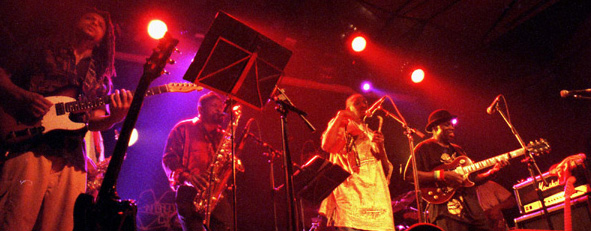





Aside from being an Afro-beat group,
ghetto blaster
is the term for the portable sound systems that are such a familiar sight in the US.
> Their story
The Ghetto Blaster adventure starts in 1983, when two French musicians (Romain Pugebet and Stéphane Blaes) ask Pascal Imbert to produce them. He decides to go with them to Lagos (Nigeria) by car in order to make a record with the musicians he knows over there.
This trip from Paris to Lagos was filmed as a musical documentary by Stéphane Meppiel (producer-director), François Kotlarski (cameraman) and Eric Münch (sound engineer). Martin Meppiel, Isabelle Soto and Nathalie Vierney also end up joining them in the adventure.
Over there, Kiala Nzavotunga (guitar and lead vocals), Ringo Avom (drums) and Udoh Essiet (percussion) - ex musicians from Fela & Egypt 80' - join the French musicians, as well as Betty Ayaba (vocals) and Willy N'for (bass and lead vocals) - a musician with Sonny Okossun at that time. After several months playing their afro-beat/afro-funk music at the Black Pussy Cat, a Nigerian bar where people spend the night dancing to juju and afro-beat music, Ghetto Blaster decide to try their luck in Europe.
They arrive in Paris in 1983, on Stéphane Meppiel's barge, moored at Nogent-sur-Marne (94). The barge becomes their home and rehearsal studios and moves into Paris in 1984 to be moored beside the Gare d'Austerlitz. The film of this story is broadcast on Antenne 2 in 1984.
The same year, Ghetto Blaster brings out "Preacher Man / Efi Ogunle", a maxi-single on Island, Chris Blackwell's label.
In 1985, Ghetto Blaster brings out the album "People" on the Mélodie label (executive producer Jacques Goldstein). This album, recorded and mixed in five days in the Marcadet studio (Paris), makes their music known to a wider audience. They do a tour across the United States in 1988 - playing in such places as Boston, New York, Miami and Los Angeles - and play with some of the greatest, opening concerts for Fela Kuti, Kool & the Gang, Archie Shepp, James Brown, Maceo Parker and Manu Dibango.
At the end of the 80's, the death of the singer Betty Ayaba, then that of the bassist Willy N'for in 1997, separates the group for a while, each of them pursuing their own personal projects.
In 1999, after a long silence, Ghetto Blaster reforms. There are three of them now : Kiala Nzavotunga (founding member, guitarist and lead vocals), Frankie Ntoh Song (founding member, keyboard and vocals) and Myriam Betty (singer who joined the group on their arrival in France).
Their "comeback" concert took place in 1999, at the African Festival of Delft (the Netherlands).
In 2002, the album People is re-released on vinyl by Follow Me Records.
In 2003, Ghetto Blaster celebrate 20 years of music together and the release of the album "River Niger", on Next Record, distributed by Next Music. It is produced by Stéphane Blaes and Kiala Nzavotunga.
> Their music (written by Nazaire Bello)
Ghetto Blaster keep alive the flame which was maintained for more than a quarter of a century by the godfather, Fela Kuti.
First, you have the incredible riffs, frantic rhythms poured into jazz, funk, rock, rhythm'n'blues and soul. Their afro beat with its special, modern style proves that they remain the pioneers of afro rock and afro jazz in Europe. The voices of african beat never die down. It has to be said that the group carried the afro beat wave in their wake through Europe, particularly in the 80s, before there was a lull in their activity. Then they came back in force, thanks to a second album which came out in 2003, and above all on stage, where they never let the fire cool on their fusion style, throbbing with an explosive groove.
While keeping their hold on the secrets of the afro beat temple, Ghetto invite us to new horizons, without confusing the genres, catalysing a new energy which tends towards the Rock'n'Funk'n'Blaster. Their latest album proves it. It symbolises their journey and their maturity. The lyrical soaring of " Batu Mwindu " takes you to Zaïre. " Je m'appelle Kiala " is a really fresh, open track which invites us to celebration among friends. After a few other musical escapades, we come back to the roots, as " Reality " well and truly proves that the reality of afro beat hits home as well as ever.
The group, which has only brought out two albums, never stops increasing the quality of its creative output. You can be sure that the future will bring us yet more sumptuous productions, synonymous with the consecration of such great efforts.







